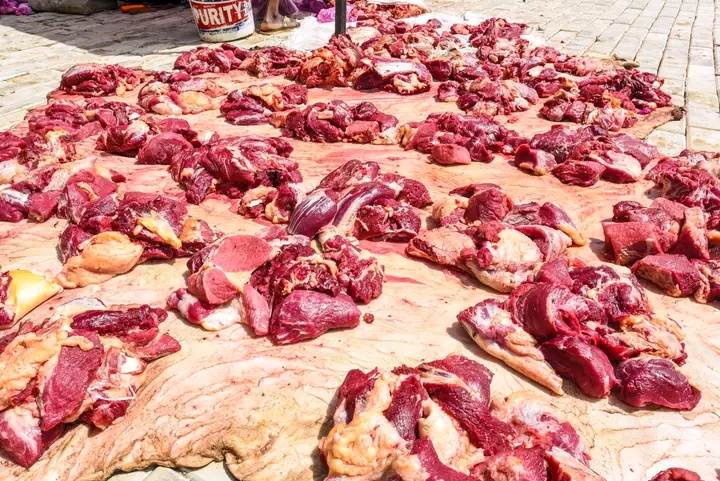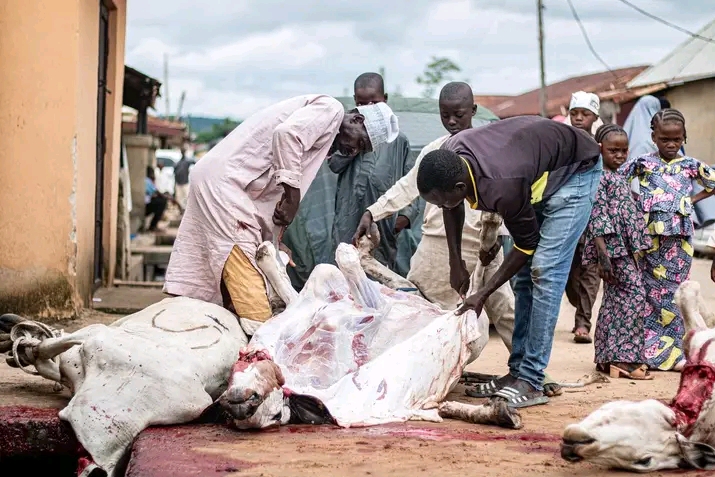It was past nightfall in the city of Jalingo, and the air around Abdullahi HammanGabdo’s house was redolent with the aroma of fried meat. Little children bobbed around in excitement, chanting traditional tunes in anticipation of Eid al-Fitr, the Muslim festival that marks the end of the month-long Ramadan fasting. In the backyard, where meatballs sizzled in a large pan of oil, Habiba, HammanGabdo’s wife, took care that no piece fell on the ground.
Seeing the toil her husband faced to purchase the meat, she couldn’t afford to let any piece slip from the pan. As inflation took a toll on the family’s income, Habiba admitted that meat had become a luxury for them. “We have made long-time preparations to see that we have some meat that we can eat and even share with neighbours. It’s a festive period and we don’t want to miss out,” she said.
For this year’s Eid, HammanGabdo had secured meat at Jalingo abattoir, thanks to a bulk-shopping system known as Watanda, which ensured that low-income families had meat enough to celebrate the feast amid the soaring cost of cattle.
Popular during the season of Ramadan, Watanda has been practised for many decades by civil servants and small business owners in northern Nigerian communities, according to HammanGabdo.
HammanGabdo, 48, has been working in the Agricultural Department of the Jalingo local government secretariat since 1998. Life was all but harsh for him. Alongside his salary, he depended on a herd of cattle—inherited from his father—to raise his family and send his children to school. But not anymore.
“You know, things weren’t very expensive in the past. So we lived a happy life.” HammanGabdo lamented how things have taken a turn for the worse, leaving him without a single cow to sell. “The salary earnings couldn’t also meet up with the prices of goods in the market. You have to abandon other things and buy the most essential ones,” he said.
HammanGabdo isn’t alone in this crisis. Prime Progress tracked many families in Jalingo headed by junior civil servants who struggled with a lack of money during festive periods such as the Eid al-Fitr.
For these families, the Watanda system ensured there is meat in their houses during the celebrations.
Yakubu Muhammad shared that, since his boyhood days, he grew up to watch his father participate in Watanda. Muhammad has kept on the practice, even for his own family.
“Contributing money for Watanda makes lots of sense to us. Sometimes, the festive period will come and one may not have enough money to buy meat or with the recent inflation, prices of meat are expensive and not always constant. But if you join Watanda group and contribute your money, you must have meat to celebrate with during the festive period,” Muhammad said to Prime Progress.
He also believes that Watanda is a social lifeline for low-income earners like him.
Saving for the future
HammanGabdo’s Watanda group comprised 10 people, each with a monthly contribution of ₦5,000 to the cooperative purse. Starting in June 2023, the contribution spanned 8 months with a grand total of ₦500,000. This helped to procure a cow at a nearby cattle market, which was evenly shared among all 10 contributors on the eve of the Eid al-Fitr celebration.

As with many civil servants, HammanGabdo paid his contribution mostly from his salary. “I have been part of several Watanda groups before, but I hadn’t planned on joining this recent one. However, my wife suggested it, and it has proven to be beneficial.”
Although the group-shopping system eased the burden of inflation on many families, instances of group members being unable to fulfil their contributions because of acute money problems were common, Hassan Yusha’u, the chairman of the Watanda group, acknowledged.
“The good thing with this system like ours is that we understand situations like these. People are going through a lot. We excuse them and communicate openly while giving them a chance to complete it when they have it handy. It’s all about supporting each other to achieve a common goal,” Yusha’u explained to Prime Progress.
For every group, Yusha’u added, there is a collector to receive contributions from members or a bank account to deposit into, when cash isn’t available. To create transparency, members are updated on the amount collated at the end of the month.
Suwaiba Alkali, a shopkeeper and the only female member of the group, stated that Watanda has been a game-changer for her. As a single mother running a small business, she struggled to save money for meat for Eid al-Fitr. With her small monthly token, she had enough meat to celebrate with neighbours and well-wishers during the festive period.
“I will love to continue participating in Watanda every year. Thanks to everyone in the group for making this possible,” Alkali said.
Shared happiness
The delight among members of the Watanda group was palpable as they took their share of meat home, on the eve of Eid al-Fitr. While inflation remains high despite the recent appreciation of the Naira, Watanda remains a beacon of hope for these families during the festivities.
“We cannot say that the meat we got from Watanda can be much sufficient but at least it’s better and much more than the one we could have bought from other butchers. That leaves us to worry about rice and other ingredients needed to make a wonderful meal for the celebration,” noted Salihu Bantaje, another member of the group.
Yusha’u disclosed to Prime Progress that, in a few weeks, they would start to mobilize people for another Watanda. “We want to make early preparations so that we can get the best results for the 2025 Eid al-Fitr celebration,” he stated.
Habiba, HammanGabdo’s wife, noted that the recent Eid al-Fitr celebration was one to remember. Having fried enough meat that would last days after the festival day, she felt “excited sharing it with my neighbours,” she said.
For Habiba, a mother of six, Eid al-Fitr is a time for charity and togetherness. As such, she doles out food and meat to her neighbours and the needy.
As charities lend a hand to Nigerian families cramped by high food prices during Ramadan, HammanGabdo holds the belief that Watanda is a reliable way to support people with low incomes when things are difficult during Eid celebrations.
Although some disagree that Watanda is a solid system, HammanGabdo cherishes the system for the powerful community it creates, filled with love and support. “We’ll keep doing Watanda and hope it helps us keep having a big Eid al-Fitr celebration.”
In Jalingo, during the Eid al-Fitr celebrations, Abdullahi HammanGabdo's family, like many others, relied on the traditional Watanda system to secure meat amid high inflation. Watanda, a bulk-shopping cooperative, allows low-income families to pool money over several months to purchase cattle, ensuring they have meat for the festivity. HammanGabdo, a long-time civil servant, highlighted that the system has been crucial for sustaining celebrations despite economic hardships. Other families and individuals in the community, including Yakubu Muhammad and shopkeeper Suwaiba Alkali, also praised Watanda for its role in maintaining social bonds and mitigating the financial burden. While inflation remains a challenge, the communal support through Watanda provides significant relief and ensures that festivity continues despite economic constraints.






